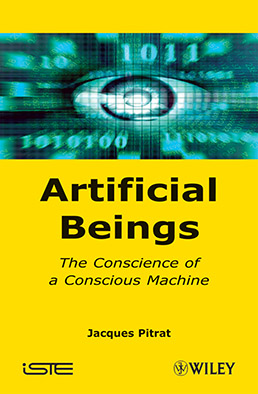
Everybody agrees that consciousness and conscience are essential characteristics of human intelligence. Some people believe that it is impossible to create artificial beings with these possibilities, and they conclude that the ultimate goal of Artificial Intelligence is hopeless. This book shows that not only is it possible to create artificial beings with capacities in both domains, but that they do it in a way different from ours, creating a new kind of consciousness. This affords them performances that we cannot reach, not for lack of intelligence, but because our intelligence depends on networks of neurones imposing restrictions which do not apply to computers.
At the start of the creation of an artificial scientist, the main goal was not to study the possibility of building the conscience of a conscious machine. However, after some years of experimentation, it happened that many characteristics implemented for improving the efficiency of the system were linked to these capacities. So, when they are present, it is because they are essential for the performances. Moreover, as the goal was not to imitate human behavior, some of these methods are different from those used by the neurones in the human brain. In this way, we are at the threshold of a new science, artificial cognition, which is interested in the methods for giving cognitive capabilities to artificial beings making fully use of the power of computers.
1. Presenting the actors
2. Consciousness and Conscience
3. What does "itself" mean for an artificial being?
4. Some aspects of consciousness
5. Why is auto-observation useful?
6. How to observe oneself?
7. The conscience
8. Implementing a conscience
9. Around the conscience
10. What is the future for CAIA?
Jacques Pitrat worked at the end of the 1950s in a computer laboratory and he was fascinated by the first AI papers. This led him to begin a thesis on Artificial Intelligence in 1960. From 1967 to 2000 he was a researcher at the French CNRS, and for 8 years he was director of the AI laboratory at the University of Paris 6.
He has experimented with several AI systems, mainly for studying how to use metaknowledge efficiently. He has taught AI for more than 30 years, and he has directed 70 AI theses. He has written five books on AI, and he is still a researcher at the LIP6 at the University of Paris 6. He is a fellow of the AAAI and ECCAI.